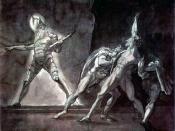Prince Hamlet is entrapped in a world of evil that is not of his own creation. He therefore, must rely on himself to make his own decisions. He also ends up putting his faith in God, and fearing the consequences. It is the story of the psychological development of a young man that has realized that he can not depend on anyone but himself. Dealing with his father's murder cause Hamlet to grow up fast. His family, Ophelia, and his school friends all appear to turn against him and to rally themselves around the evils of Claudius. Hamlet is a symbol of ordinary humanity and how people grow psychologically, whether good or bad.
The Hamlet that Shakespeare begins to develop in Act I is a typical mortal, bowed down by his human imperfections. Hamlet voices his thoughts on the issue of suicide and contemplates, "O that this too too solid flesh would melt...'
(I. ii. 135). In this first soliloquy, Hamlet decides not to kill himself because God has 'fix'd/ His canon 'gainst self-slaughter" (I. ii. 131-2). He has realized that God is watching him and he cannot give up his life. Hamlet has yet another spiritual revelation when he sees his dead father's spirit. This spirit, which is really just in his own head, tells him that he must continue to live in the "unweeded garden, / That grows to seed' in order to fulfill the obligation he has to his father" (I.ii. 135-6). He not only realizes that he must do more than kill himself, he also has to avenge his father's death.
Because I am trying to see Hamlet as more a story of personal growth than a dark murder mystery, I find that Shakespeare emphasizes the emotional, rather than the physical obstacles that Hamlet must...


